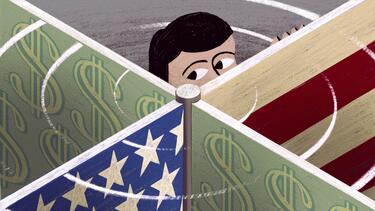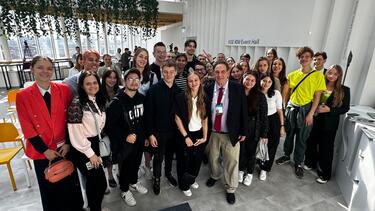All Insights Articles
U.S. Government Regulators May Be Favoring Their Future Private-Sector Employers
How does the “revolving door” between government and industry benefit firms? A new study co-authored by Yale SOM’s Ivana Katic finds that firms see a smoother regulatory process in the months before they hire a former regulator, suggesting that they may find favor via the promise of future employment.

To Prevent a Wider War in the Middle East, Choke Off Iran’s Oil Sales
Through its proxies, Iran is making aggressive moves against Israel and the U.S. Yale SOM’s Jeffrey Sonnenfeld and Steven Tian write that the U.S. has an option for effective deterrence: cutting off Iran’s oil revenue by strengthening sanctions and imposing a price cap.

Does Having a Choice Provide an Illusion of Control?
A study co-authored by Yale SOM’s Joowon Klusowski and Deborah Small finds giving people a choice doesn’t makes them think they are more likely to achieve a positive outcome and provides an explanation of why the opposite can appear to be to be true.

How Peace and Prosperity in the Middle East Can Still Be Reached
Paradoxically, the invasion of Israel could could help accelerate progress toward regional peace, write Yale SOM’s Jeffrey Sonnenfeld, diplomat Dennis Ross, and investor Adam Boehler, former CEO of the U.S. International Development Finance Corporation.

The Russian Oil Price Cap Can Work Again
With oil prices rising, Russia is finding ways around the price cap set earlier this year. But Yale SOM’s Jeffrey Sonnenfeld, who advised on its implementation, writes that with rapid adjustments, the program can continue to hobble Vladimir Putin’s war effort.

How a Time Out Can Help Address Bias
The Bias Time Out, developed by a team including Gina Calder ’22 and Dr. Cecelia Calhoun ’21, helps healthcare teams spot and address bias in real time.

For Companies Eyeing AI, the Question Is ‘When, Not If’
Generative AI may well be transformative, but firms will need to make judgments on whether the costs, challenges, and risks of being a first mover makes sense.

The Budget Deal Is a Tragedy for Ukraine
With hours to go before a government shutdown, Congress passed a short-term spending bill—but the deal came at the cost of aid for Ukraine. Yale SOM’s Jeffrey Sonnenfeld writes that even if a separate funding bill eventually passes, the move weakens the coalition against Russia.

What Awaits Ukraine Once the War Ends? Prosperity, For One Thing
Once freed from Russian aggression, Ukraine will thrive, argues Prof. Jeffrey Sonnenfeld.

Does Capital Spending on Schools Improve Education?
Yale SOM’s Barbara Biasi and her co-authors found that some projects improve test scores and others boost local property values—but they aren’t the same ones.
